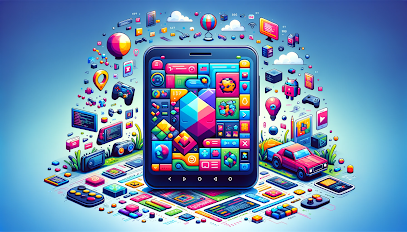In the realm of game development, artistic vision, and technical execution
play pivotal roles in bringing a game to life. Concept artists and 3D modelers
are at the heart of this creative process. Their collaboration, especially
in a concept art studio, is essential in transforming imaginative ideas
into visual realities. This article delves into their roles and
contributions to game development, a field increasingly relying
on these professionals, including those who
hire Unity game developers for advanced game
creation.
The Crucial Role of Concept Artists
Visualizing Ideas:
Concept artists are the visionaries who lay the groundwork
for the game's visual elements. They create the initial sketches
and paintings that depict the game's universe, including characters,
environments, objects, and more. Their creative outputs are the
blueprints for what the game will eventually look like.
Concept artists are the visionaries who lay the groundwork
for the game's visual elements. They create the initial sketches
and paintings that depict the game's universe, including characters,
environments, objects, and more. Their creative outputs are the
blueprints for what the game will eventually look like.
Setting the Tone and Style:
The work of a concept artist goes beyond mere sketches.
They are responsible for setting the tone, mood, and overall
style of the game. They work closely with game directors and
writers to ensure their art aligns with the game's narrative and
aesthetic goals.
The work of a concept artist goes beyond mere sketches.
They are responsible for setting the tone, mood, and overall
style of the game. They work closely with game directors and
writers to ensure their art aligns with the game's narrative and
aesthetic goals.
Collaboration with Development Teams:
Concept artists often work in a concept art studio, where they
collaborate with various departments. They provide the
necessary visual guidelines and inspiration that guide the
development team, including those who specialize in Unity,
a popular game development engine.
Concept artists often work in a concept art studio, where they
collaborate with various departments. They provide the
necessary visual guidelines and inspiration that guide the
development team, including those who specialize in Unity,
a popular game development engine.
The Integral Role of 3D Modelers
Bringing Concepts to Life:
3D modelers take the concept art and turn it into
three-dimensional models. Using software like
Blender, Maya, or 3ds Max, they create the playable
characters, environments, and objects that players
interact with.
3D modelers take the concept art and turn it into
three-dimensional models. Using software like
Blender, Maya, or 3ds Max, they create the playable
characters, environments, and objects that players
interact with.
Detailing and Texturing:
Modelers don't just shape the 3D figures; they also
texture and detail them. This process involves adding
colors, textures, and materials to the models, making
them as realistic or stylized as the game requires.
Modelers don't just shape the 3D figures; they also
texture and detail them. This process involves adding
colors, textures, and materials to the models, making
them as realistic or stylized as the game requires.
Collaboration with Animators and Programmers:
3D modelers work closely with animators and
programmers, especially those who hire Unity game
developers. Unity's versatile engine allows for
seamless integration of 3D models with game
mechanics and animations.
3D modelers work closely with animators and
programmers, especially those who hire Unity game
developers. Unity's versatile engine allows for
seamless integration of 3D models with game
mechanics and animations.
Collaboration: Concept Art Studios and
Unity Game Developers
The synergy between concept artists, 3D modelers, and Unity
game developers is crucial in transforming a conceptual idea
into a tangible, interactive gaming experience. Within concept art
studios, this collaborative process thrives. These studios serve as
a hub where artists and developers unite their efforts, aligning
artistic concepts with the technical requirements of game
development to ensure a harmonious blend of visuals and gameplay.
The Impact of Unity in Game Development
The demand for Unity game developers is on the rise due to
their proficiency in working within a team-oriented framework.
Unity's game engine stands out for its adaptability and
comprehensive capability to manage both the creative and technical
facets of game development. This harmonious blend of features
positions Unity as an excellent tool for integrating the artistic visions
of concept artists with the practical skills of 3D modelers,
fostering a cohesive game development process.
Conclusion
To sum up, the involvement of concept artists and 3D modelers
is crucial in the realm of game development. Working together,
particularly within the setting of a concept art studio, they ensure
the game's aesthetics and interactive features captivate and immerse
players. As the gaming sector continues to advance, there's a growing
need for skilled professionals, including those proficient in Unity
game development. The synergy of their expertise is essential for
crafting games that are not only visually impressive but also deeply
engaging in terms of gameplay and story.

.jpg)

.jpg)
No comments:
Post a Comment